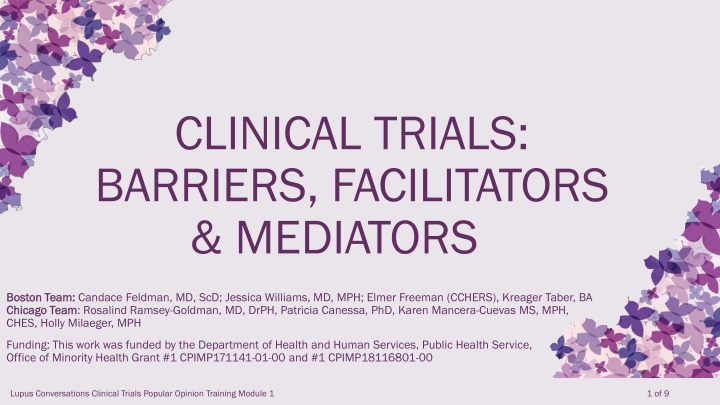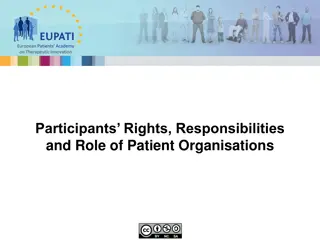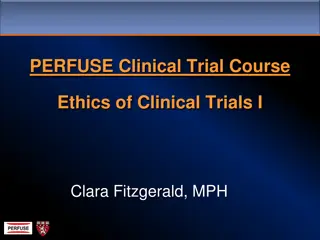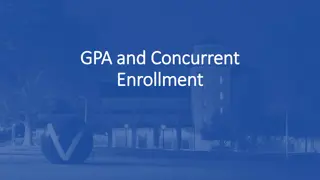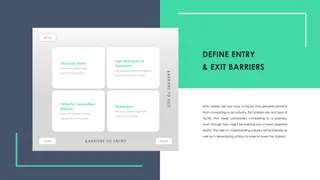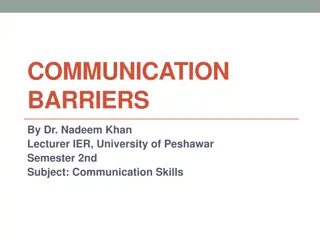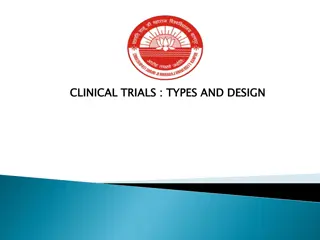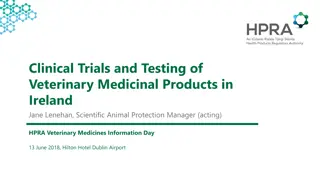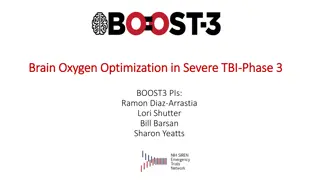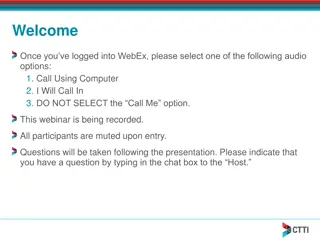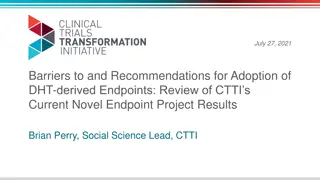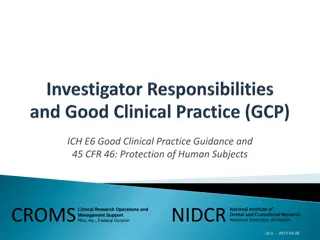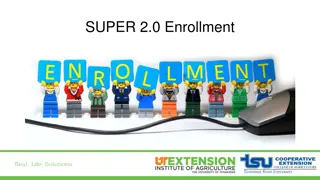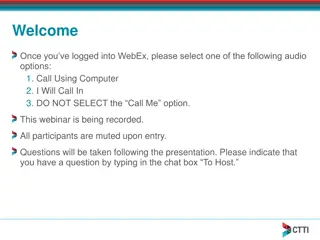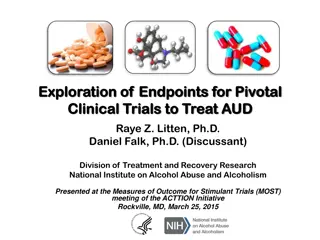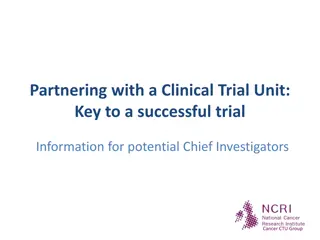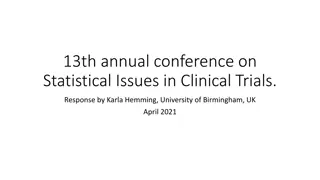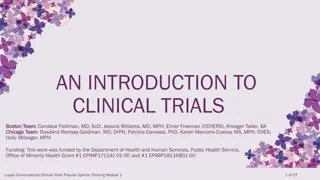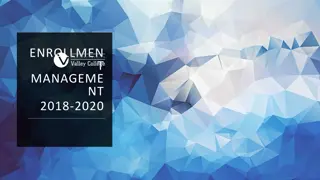Clinical Trials: Barriers and Facilitators in Enrollment Process
Explore the barriers, facilitators, and mediators in clinical trials enrollment process, along with examples and definitions discussed during Lupus Conversations focus groups. Understand how family support, healthcare provider relationships, and patient motivation play key roles in easing the enrollment process for eligible participants.
Uploaded on Sep 27, 2024 | 0 Views
Download Presentation

Please find below an Image/Link to download the presentation.
The content on the website is provided AS IS for your information and personal use only. It may not be sold, licensed, or shared on other websites without obtaining consent from the author.If you encounter any issues during the download, it is possible that the publisher has removed the file from their server.
You are allowed to download the files provided on this website for personal or commercial use, subject to the condition that they are used lawfully. All files are the property of their respective owners.
The content on the website is provided AS IS for your information and personal use only. It may not be sold, licensed, or shared on other websites without obtaining consent from the author.
E N D
Presentation Transcript
CLINICAL TRIALS: BARRIERS, FACILITATORS & MEDIATORS Boston Team: Boston Team: Candace Feldman, MD, ScD; Jessica Williams, MD, MPH; Elmer Freeman (CCHERS), Kreager Taber, BA Chicago Team Chicago Team: Rosalind Ramsey-Goldman, MD, DrPH, Patricia Canessa, PhD, Karen Mancera-Cuevas MS, MPH, CHES, Holly Milaeger, MPH Funding: This work was funded by the Department of Health and Human Services, Public Health Service, Office of Minority Health Grant #1 CPIMP171141-01-00 and #1 CPIMP18116801-00 Lupus Conversations Clinical Trials Popular Opinion Training Module 1 1 of 9
Objectives Discuss the barriers, facilitators barriers, facilitators and mediators and mediators in clinical trials enrollment We will be sharing examples that were discussed during our Lupus Conversations focus groups Lupus Conversations Clinical Trials Popular Opinion Training Module 1 2 of 9
Definitions Barriers Things that make it more difficult a clinical trial Decrease Decrease the chance that an eligible participant will want to enroll Facilitators Make it easier easier for participants to enroll or participate in a clinical trial Increase Increase the chance that an eligible participant will want to enroll Facilitators are helpers helpers that increase the likelihood of enrollment more difficult for eligible participants to enroll or participate in Lupus Conversations Clinical Trials Popular Opinion Training Module 1 3 of 9
Facilitators to Clinical Trials Enrollment Family, peer or partner support Family, peer or partner support Inclusion of patient s support network as part of the clinical trial recruitment process and allow time to address their questions Supportive relationship with Healthcare Provider Supportive relationship with Healthcare Provider Patients and Providers should be able to discuss the risks and benefits of a clinical trial, both before the patient is enrolled and during the study Include discussion with participants to share clinical trials study findings Include discussion with participants to share clinical trials study findings Comments Comments: The : The patient motivation or compelling stage of the disease that leads patient motivation or compelling stage of the disease that leads into finding other treatment solutions. into finding other treatment solutions. Lupus Conversations Clinical Trials Popular Opinion Training Module 1 4 of 9
Facilitators for Clinical Trials Enrollment II Clear Explanation of the Study s Purpose and Goals Clear Explanation of the Study s Purpose and Goals Participants should understand why the study is being conducted and why they are eligible Allowing Time for Informed Consent Allowing Time for Informed Consent Patients should be given enough information about the risks and benefits of enrolling in a study to make the decision that is right for them right for them Open Communication Between Patients, PI, and Study Staff Open Communication Between Patients, PI, and Study Staff Patients should feel comfortable asking the study staff and PI questions, which will most likely be answered with multiple conversations multiple conversations Telling Patients the Study s Results Telling Patients the Study s Results Study Staff should share the results of the Trial with the Patients in an understandable way Lupus Conversations Clinical Trials Popular Opinion Training Module 1 5 of 9
Barriers to Clinical Trials Enrollment Health Status Health Status Patient may be too sick. Patient may not have a confirmed diagnosis of lupus Patient may have a history of prior withdrawal due to medical complications through the course of prior clinical trials. Confusing Research Materials Confusing Research Materials Unclear and lengthy consent forms Inaccessible recruitment documents Confusing explanations of the study s protocol Lack of peer or family support Lack of peer or family support Family and friends seeing clinical trials as unsafe Confusion about what a clinical trial is and what enrollment will mean Historical Injustice and Racism Historical Injustice and Racism Past and present experiences of discrimination and racism in healthcare and every day life may contribute to mistrust and limit participation Lupus Conversations Clinical Trials Popular Opinion Training Module 1 6 of 9
Barriers to Clinical Trials Enrollment II Health Literacy Challenges Health Literacy Challenges Descriptions of study drug or study protocol in overly-medical terms. Meeting the participant at their literacy level. Linguistically-competent translation and adaptation to culturally-related concepts. Financial and Time Constraints Financial and Time Constraints Patients may not be able to take time off of work to go to study visits or have competing obligations competing obligations. Financial burden of paying for childcare, transportation, or parking to attend study visits or have Lupus Conversations Clinical Trials Popular Opinion Training Module 1 7 of 9
QUESTIONS? THANK YOU! Lupus Conversations Clinical Trials Popular Opinion Training Module 1 8 of 9
Funding and Acknowledgements Funding: This work was funded by the Department of Health and Human Services, Public Health Service, Office of Minority Health Grant #1 CPIMP171141-01-00 and #1 CPIMP18116801-00 Boston Team: Boston Team: Candace Feldman, MD, ScD; Jessica Williams, MD, MPH; Elmer Freeman (CCHERS), Kreager Taber, BA Chicago Team Chicago Team: Rosalind Ramsey-Goldman, MD, DrPH, Patricia Canessa, PhD, Karen Mancera-Cuevas MS, MPH, CHES, Holly Milaeger, MPH 9
